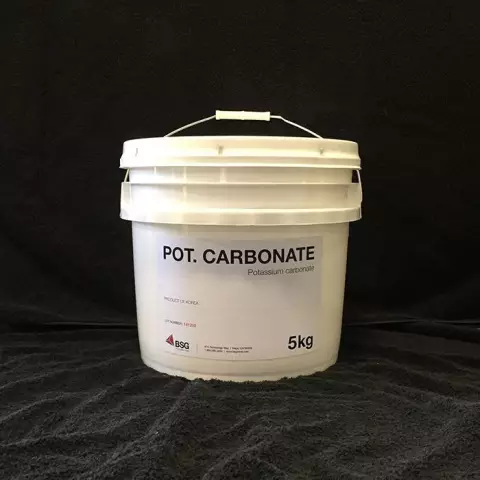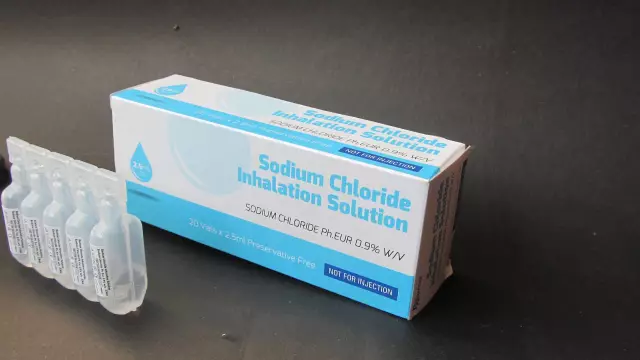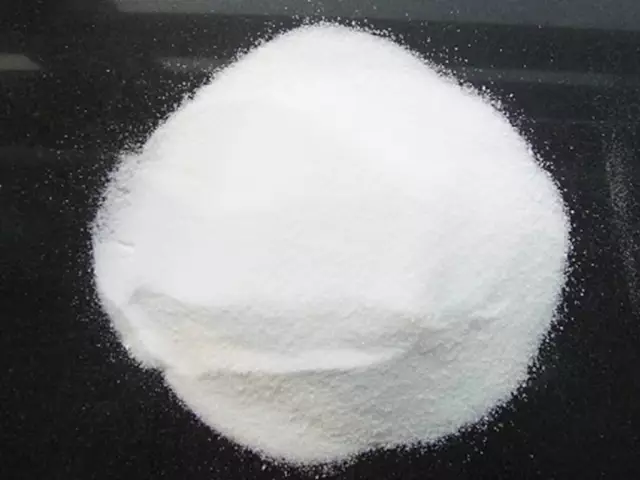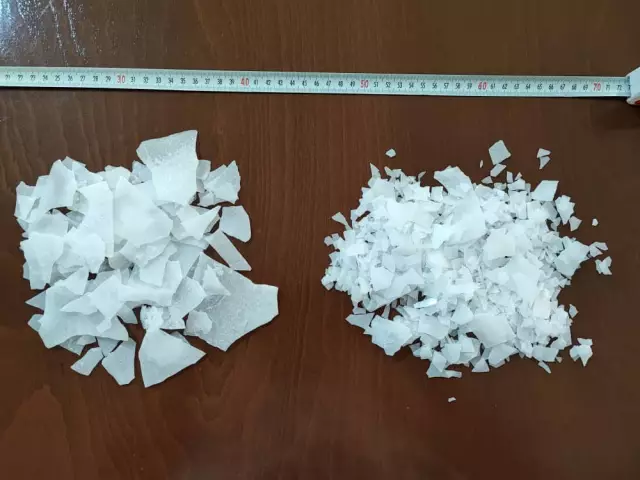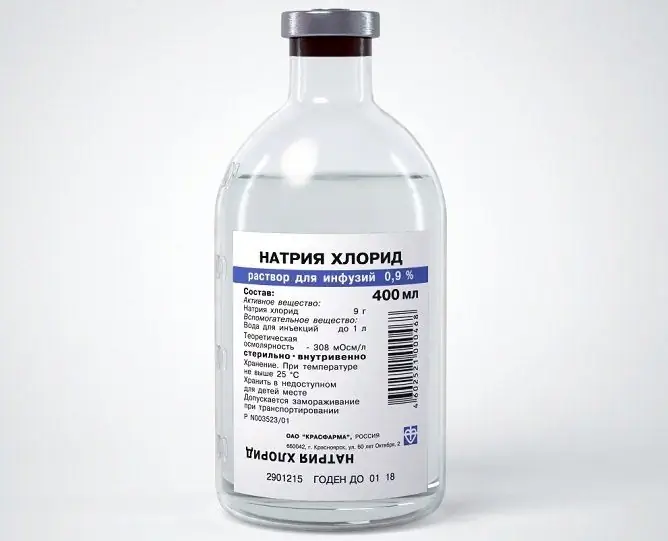- Author Rachel Wainwright wainwright@abchealthonline.com.
- Public 2023-12-15 07:39.
- Last modified 2025-11-02 20:14.
Potassium chloride
Instructions for use:
- 1. Release form and composition
- 2. Indications for use
- 3. Contraindications
- 4. Method of application and dosage
- 5. Side effects
- 6. Special instructions
- 7. Drug interactions
- 8. Analogs
- 9. Terms and conditions of storage
- 10. Terms of dispensing from pharmacies
Prices in online pharmacies:
from 4 rubles.
Buy

Potassium chloride is a drug used to replenish potassium deficiency in the body.
Release form and composition
Potassium chloride is available in the following dosage forms:
- Concentrate for the preparation of a solution for infusion 30, 40, 75, 150 mg / ml (5, 10 ml in ampoules with an ampoule knife, 5, 10 ampoules in blister or plastic cell packs (pallets), 1 or 2 packs in a cardboard a pack or 5, 10 ampoules in a cardboard box; 100, 200 ml in bottles for blood and blood substitutes, 1 bottle in a cardboard box, 28 or 35 packs in a cardboard box);
- Concentrate for the preparation of a solution for infusion and oral administration 40 mg / ml (in polymer ampoules of 5, 10 ml, 5 or 10 ampoules in a cardboard box);
- Solution for intravenous administration 40 mg / ml (10 ml each in ampoules with an ampoule knife, 5 or 10 ampoules in plastic cell packages (pallets), 1 or 2 pallets in a cardboard box);
- Solution for intravenous administration and oral administration 40 mg / ml (10 ml each in ampoules with an ampoule knife, 5 or 10 ampoules in plastic cell packs (pallets), 1 or 2 pallets in a cardboard box or 10 ampoules in a cardboard box) …
The composition of 1 ml of a concentrate for the preparation of a solution for infusion contains an active substance: potassium chloride - 30, 40, 75, 150 mg.
The composition of 1 ml of concentrate for the preparation of a solution for infusion and oral administration, a solution for intravenous administration and a solution for intravenous administration and oral administration includes the active substance: potassium chloride - 40 mg.
Indications for use
- Hypokalemia (including against the background of prolonged vomiting and / or diarrhea, diabetes mellitus, therapy with certain diuretics, antihypertensive drugs, glucocorticosteroids);
- Paroxysmal tachycardia, glycosidic intoxication (treatment and prevention);
- Ectopic arrhythmias in patients with myocardial infarction during the acute course (treatment and prevention).
Contraindications
- Complete atrioventricular block;
- Hyperkalemia;
- Chronic renal failure
- Adrenal insufficiency;
- Metabolic disorders (hypovolemia with hyponatremia, acidosis);
- Simultaneous use with potassium-sparing diuretics;
- Age up to 18 years (the safety and efficacy of the drug in this age group of patients has not been established);
- Hypersensitivity to drug components.
Potassium chloride is used with caution in AV conduction disorders.
Before prescribing potassium chloride, pregnant women should assess the benefit / risk ratio for maternal and fetal health. If it is necessary to use the drug during breastfeeding, it is necessary to decide on its termination.
Method of administration and dosage
Potassium chloride is injected intravenously in a stream, if necessary - intravenously in combination with a 5% dextrose solution.
Depending on the indications, the drug is prescribed:
- Hypokalemia, accompanied by heart rhythm disturbances: 4-5 times a day, 1-1.5 g (the dose is reduced after the heart rate is restored);
- Glycosidic intoxication: 2-3 g per day, in severe cases it is possible to increase the daily dose up to 5 g;
- Attacks of paroxysmal tachycardia (relief): on the first day of use - 8-12 g, then the daily dose is reduced to 3-6 g;
- Severe intoxication, requiring rapid elimination of pathological phenomena, as well as persistent vomiting: intravenous administration of a solution of Potassium chloride 40 mg / ml in 40% glucose solution. 50 ml of the solution should be diluted 10 times with water for injection (up to a volume of 500 ml) and injected drip (20-30 drops per minute). Also, the drug can be administered intravenously drip at the rate of 2.5 g in 500 ml of 5% dextrose solution or 0.9% sodium chloride solution;
- Ectopic arrhythmias in myocardial infarction (treatment and prevention): use a polarizing mixture - a solution of Potassium chloride in 5-10% dextrose solution (with the addition of short-acting insulin, at the rate of 1 U per 3-4 g of dry dextrose).
Side effects
During therapy, the following disorders may develop:
- Cardiovascular system: arrhythmias, low blood pressure, heart block or cardiac arrest;
- Nervous system: muscle weakness, paresthesias, confusion;
- Others: allergic reactions, hyperkalemia.
special instructions
During therapy, the electrocardiogram, the content of potassium ions in the blood serum should be monitored, in the treatment of hypokalemia - the acid-base state.
Following a diet high in sodium increases the excretion of potassium from the body.
When using potassium chloride, it must be borne in mind that fatal hyperkalemia can be asymptomatic and develop rapidly.
Drug interactions
Potassium chloride with solutions of cardiac glycosides is pharmaceutically compatible (improves their tolerance).
With simultaneous use with beta-blockers, cyclosporine, potassium-sparing diuretics, heparin, angiotensin-converting enzyme inhibitors, nonsteroidal anti-inflammatory drugs, the risk of hyperkalemia may increase.
Potassium chloride enhances the negative batmo- and dromotropic effect of antiarrhythmic drugs.
Analogs
Potassium chloride analogs are: Potassium chloride B. Brown, Potassium chloride Bufus, Kalipose-Prolongatum, Caldium, Potassium-Normin, Calcium chloride and Sodium chloride, Xylate, Gluxyl, Magnesium sulfate, Lactoxyl, Soda-Buffer, Reamberin.
Terms and conditions of storage
Keep out of reach of children at a temperature of 15-25 ° C.
Shelf life:
- Concentrate for solution preparation for infusion - 1 year;
- Solution for injection - 3 years.
Terms of dispensing from pharmacies
Dispensed by prescription.
Potassium chloride: prices in online pharmacies
|
Drug name Price Pharmacy |
|
Potassium chloride bufus 40 mg / ml concentrate for preparation of solution for infusion 10 ml 100 pcs. RUB 4 Buy |
|
Potassium chloride 40 mg / ml solution for intravenous administration 10 ml 10 pcs. RUB 30 Buy |
|
Potassium chloride bufus 40 mg / ml concentrate for preparation of solution for infusion 10 ml 10 pcs. RUB 45 Buy |
|
Potassium chloride 40 mg / ml concentrate for preparation of solution for infusion 10 ml 10 pcs. RUB 50 Buy |
|
Potassium chloride 40 mg / ml concentrate for preparation of solution for infusion 10 ml 10 pcs. 52 RUB Buy |
|
Potassium chloride 40 mg / ml concentrate for solution for infusion and oral administration 10 ml 10 pcs. 52 RUB Buy |
|
Potassium chloride 40 mg / ml solution for intravenous administration 10 ml 10 pcs. RUB 55 Buy |
|
Potassium chloride 40 mg / ml solution for intravenous administration 10 ml 10 pcs. RUB 61 Buy |
|
Potassium chloride B. Brown 40 mg / ml concentrate for preparation of solution for infusion 10 ml 20 pcs. 278 r Buy |
|
Potassium chloride conc. for prig solution for inf. 75mg / ml 200ml 28 pcs. RUB 2980 Buy |
|
Potassium chloride 75 mg / ml concentrate for preparation of solution for infusion 200 ml 28 pcs. RUB 2980 Buy |
| See all offers from pharmacies |
Information about the drug is generalized, provided for informational purposes only and does not replace the official instructions. Self-medication is hazardous to health!


